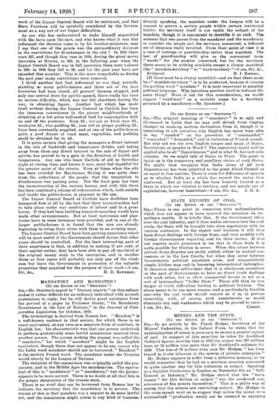STATE EXPORTS OF COAL
(To THE Enrroa Or THE " SPECTATOR.")
Sus,—There is one point in connexion with nationalization which does not appear to have received the attention its im- portance merits. It is briefly this. If the Government takes over the coal industry, and it thus makes entrance into the coal trade, the State will be brought into close negotiation with its various customers. In the export coal business it will thus have direct dealings with foreign firms, and very possibly with foreign Governments requiring coal for their navies. It does not require much prescience to see that in these deals it is quite possible for friction to occur. When this arises between private firms disputes are easily settled, either by mutual con- cessions or in the Law Courts, but when they occur between Governments political questions arise, and comparatively simple hitches may end in becoming international imbroglios. It therefore seems self-evident that it is wholesome procedure on the part of Governments to have no direct trade dealings with each other, but to allow commercial houses to act as a sort of intermediary "buffer State." There will then be less danger of trade difficulties leading to political friction. The above seems to be one more reason—and a particularly forcible one—why the coal trade should remain as it is, in private ownership, with, of course, such amendments as would eliminate any real weaknesses which may be proved to exist.—


































 Previous page
Previous page